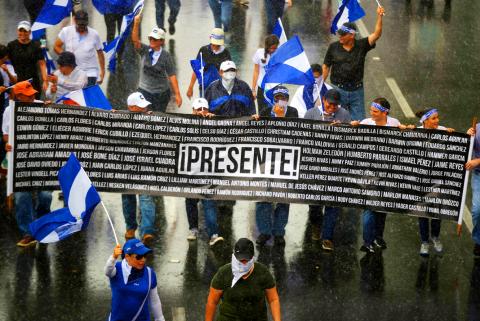Four police officers and a protester died in Nicaragua on Thursday, the latest of about 270 fatalities in months of demonstrations against Nicaraguan President Daniel Ortega.
The bloodshed prompted three days of nationwide protests against the government of the poor Central American country, including a general strike yesterday and a car caravan today through flash-point areas of the capital, Managua.
The deaths occurred in the southeastern town of Morrito as marching protesters, some of them armed, came under attack from police and paramilitaries and responded with gunfire, said Francisca Ramirez, head of the Civic Alliance for Justice and Democracy, an opposition group.

Photo: AFP
Police confirmed the death toll, but blamed the violence on “terrorist groups” that pretended to be carrying out a peaceful march and opened fire on a police station.
Protesters also abducted nine police officers and attacked the town hall, the police said in a statement.
Morrito is a town of 6,000 that is home to many farmers who own guns to protect their land.
In Managua, thousands of people waving blue-and-white Nicaraguan flags on Thursday marched along downtown avenues in a violence-free procession, many chanting: “He must go,” referring to Ortega.
Carolina Aguilar, 52, accused the Ortega government of killing protesters with impunity.
“We cannot live with a murderer, with a scorpion that kills us day after day. I would give my life for this end,” she said.
The protests erupted in Nicaragua on April 18, initially against now-scrapped pension reforms.
However, they have since boiled over into demands for Ortega, the Sandinista guerrilla leader who led a revolt that ousted US-backed then-Nicaraguan president Anastasio Somoza in 1979, to step down.
Ortega ruled until 1990 and was then re-elected in 2007. He is now serving his third straight term of this presidency.
His detractors have accused him and his wife, Nicaraguan Vice President Rosario Murillo, of running a brutal dictatorship.
In Washington, the Organization of American States yesterday convened a session to discuss the crisis in Nicaragua.
Meanwhile, a US House of Representatives panel unanimously passed a bipartisan resolution accusing the Ortega government of repression.
“The continued violence and oppression of the Ortega regime is reprehensible,” House Foreign Affairs Subcommittee on the Western Hemisphere Chairman Paul Cook said.
Responding to the three-day protest movement, Ortega’s government announced a countermeasure: A procession yesterday from Managua to Masaya, 30km to the south, in remembrance of the Sandinista revolution.
Once a left-wing guerrilla leader who took over after Somoza was ousted by the Sandinista National Liberation Front, Ortega has himself become the focus of public ire.
During his stint in power from 1979 to 1990, Ortega’s government had to fight US-backed counterrevolutionaries known as the Contras.
Prior to Thursday’s five fatalities, the death toll from the three months of protests stood at 264, according to the Inter-American Commission on Human Rights.

The CIA has a message for Chinese government officials worried about their place in Chinese President Xi Jinping’s (習近平) government: Come work with us. The agency released two Mandarin-language videos on social media on Thursday inviting disgruntled officials to contact the CIA. The recruitment videos posted on YouTube and X racked up more than 5 million views combined in their first day. The outreach comes as CIA Director John Ratcliffe has vowed to boost the agency’s use of intelligence from human sources and its focus on China, which has recently targeted US officials with its own espionage operations. The videos are “aimed at

STEADFAST FRIEND: The bills encourage increased Taiwan-US engagement and address China’s distortion of UN Resolution 2758 to isolate Taiwan internationally The Presidential Office yesterday thanked the US House of Representatives for unanimously passing two Taiwan-related bills highlighting its solid support for Taiwan’s democracy and global participation, and for deepening bilateral relations. One of the bills, the Taiwan Assurance Implementation Act, requires the US Department of State to periodically review its guidelines for engagement with Taiwan, and report to the US Congress on the guidelines and plans to lift self-imposed limitations on US-Taiwan engagement. The other bill is the Taiwan International Solidarity Act, which clarifies that UN Resolution 2758 does not address the issue of the representation of Taiwan or its people in

US Indo-Pacific Commander Admiral Samuel Paparo on Friday expressed concern over the rate at which China is diversifying its military exercises, the Financial Times (FT) reported on Saturday. “The rates of change on the depth and breadth of their exercises is the one non-linear effect that I’ve seen in the last year that wakes me up at night or keeps me up at night,” Paparo was quoted by FT as saying while attending the annual Sedona Forum at the McCain Institute in Arizona. Paparo also expressed concern over the speed with which China was expanding its military. While the US

SHIFT: Taiwan’s better-than-expected first-quarter GDP and signs of weakness in the US have driven global capital back to emerging markets, the central bank head said The central bank yesterday blamed market speculation for the steep rise in the local currency, and urged exporters and financial institutions to stay calm and stop panic sell-offs to avoid hurting their own profitability. The nation’s top monetary policymaker said that it would step in, if necessary, to maintain order and stability in the foreign exchange market. The remarks came as the NT dollar yesterday closed up NT$0.919 to NT$30.145 against the US dollar in Taipei trading, after rising as high as NT$29.59 in intraday trading. The local currency has surged 5.85 percent against the greenback over the past two sessions, central